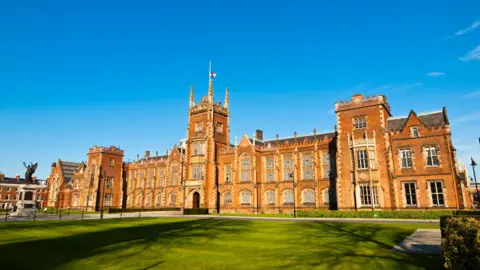Students may drop out over creche fee rise, says union
 BBC
BBCA decision to more than double childcare fees at a Queen's University Belfast's creche could lead to some students dropping out, a student's union president has warned.
Queen's students with children will have to pay £66 a day for full-time childcare from September, compared to £28 a day at present.
Queen's Students' Union president Kieran Minto said some students had told them the rise was unaffordable.
A spokesperson for Queen's said "the difficult decision to increase childcare fees highlights the significant financial pressures facing the higher education sector".
What childcare does the university provide and what does it cost?
The university has had a creche for students and staff with children for more than half a century.
It means that students with children can have them cared for while they are at classes and studying.
In 2024-25, students had to pay £28 a day for full-time childcare and £31 a day for part-time childcare.
But in 2025-26, students will have to pay £66 a day for full-time childcare and £69 a day for part-time childcare.
There is an additional £2-a-day fee if a child is under two.
Full-time fees for staff are £62 a day and they are going up by £4 from September.
As students are not in full-time work, they cannot claim existing childcare subsidies set up by Stormont.
What has been the reaction to the rise in childcare fees?
Mr Minto told BBC News NI the rise would particularly affect PhD students.
"It's a lot of folks, international PhD students that have decided to pick up with their family and move across the world to take part in cutting edge and really important research," he said.
"They're coming to us and saying 'I might have to drop out of my PhD, I'm two years in, I can't afford this anymore'.
"A lot of these students are working with very fine margins, they can't afford a small increase let alone a massive increase."
One student who got in touch with BBC News NI said that they were facing an increase of more than £800 a month for childcare from September.

The welfare officer at Queen's Students' Union, Jess Hindley, said she had probably received more queries on this issue that any other during her time in the role.
"They've just been coming to us and talking about how completely unsustainable this rise is for them," she said.
"Most of the students who've come to us have been international students who don't have access to any additional supports over here.
"Their cost of living is astronomical, and there's just nowhere for them to go."
 Getty Images
Getty ImagesWhat has Queen's said?
In a statement to BBC News NI, a Queen's spokesperson said they remained the only higher education provider in Northern Ireland to offer on-site childcare specifically for students.
"The university continues to provide a £300,000 annual subsidy to support this service, helping to keep fees broadly in line with other providers in south Belfast," they continued.
"To support those most impacted by the fee increase, all returning student users will receive a 25% discount on the new rate.
"The context for this decision is based on the university facing significant cost pressures, including a £4.6m annual increase in national insurance contributions, reduced public funding and ongoing budget uncertainty.
"These challenges made it impossible to maintain the service at its previous cost level."
What is the situation with university funding?
Leaders of Northern Ireland's five universities and university colleges had called for tuition fees to rise by more than £1,000 a year.
They said there had been a "real-terms loss caused by a legacy of sub-inflationary uplifts" in funding for higher education.
But Economy Minister Caoimhe Archibald subsequently decided not to increase university tuition fees above the usual level of inflation.
Mr Minto said he recognised Queen's was facing "a very, very difficult financial position".
"They are facing an unsustainable financial model that simply doesn't work," he said.
"We're expecting our universities to provide more and more every day.
"However, the university also has choices to make on how it spends its budget and how it allocates its budget.
"Unfortunately in this case, the choice they've made is massively negatively impacting a small but really important core of our students.
"It's going to have a massive detrimental effect without really saving a lot on the budget."
